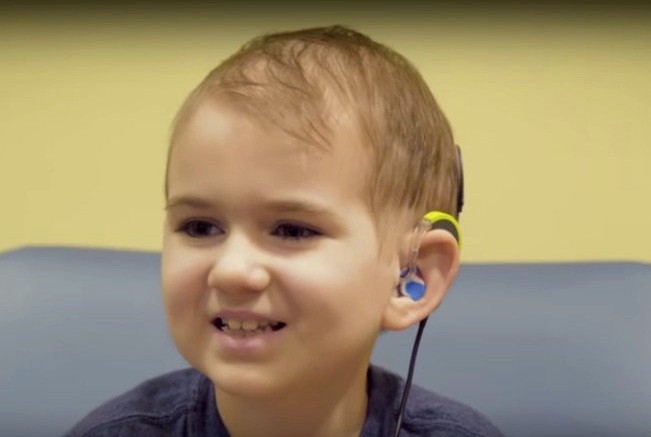Blog
-

Schoolboy Who Beat Cancer Twice But Went Deaf In The Process Hears For First Time In Seven Years!
 26 Sep , 2017
26 Sep , 2017
Schoolboy Who Beat Cancer Twice But Went Deaf In The Process Hears For First Time In Seven Years!
A hero schoolboy who beat two bouts of cancer but went deaf in the process grins as he hears the world clearly for the first time in seven years.
Little Liam Kelly, nine, wriggles nervously and is lost for words when his cochlear implant is turned on – but moments later he breaks into a huge smile.
Emotional footage shows his Mom Maureen Kelly, 38, asking, “How do I sound?”, to which perplexed Liam – who hasn’t heard her voice properly since he was two – replies: “Fine.”
The brave youngster was given just a 30 per cent chance of survival when he was struck down by neuroblastoma – cancer of the nerve cells – in 2010.
Doctors removed a tumor from his belly and he took platinum-based chemotherapy medication to help him battle the disease which had spread through his body.
Liam miraculously pulled though but the medication destroyed sensitive hair cells in his inner ears and left him with profound hearing loss.
Six months later the cancer returned and thankfully Liam beat it again! – but the exhausting battle meant his deafness was a low priority.
He used a hearing aid to help him make out certain sounds and coupled with lip-reading, he could just about work out what people were saying.
But it wasn’t until he had surgery to have a cochlear implant fitted that he was finally able to hear his friends whispering, wind rustling leaves in the trees and birds singing.
Mom-of-three Maureen, a nurse, said: “It is heartbreaking to watch your child go through hearing loss when you can clearly the world but he can hear nothing.
“His hearing was perfect before he was diagnosed with cancer but the medication affected it gradually.
“If I had burned something in the kitchen and the fire alarm went off, he would make no response to it at all.
“He could follow what you were saying if you spoke really loudly, but his hearing was similar to that of an 80 year old with hearing loss.
“Now he can hear so much more. When I ask him what it was like before, his response is, ‘It was really quiet.’
“These are things we take for granted – the little sounds that make up your day. But it was just empty for him.”
Cochlear implants are electronic devices which replace the function of the inner ear by sending sound signals to the brain, unlike aids which amplify sound.
A processor worn behind the ear ‘listens’ to sound and translates it into digital code which is then transmitted through a coil worn on the outside of the head and converted into electrical impulses.
These stimulate the inner ear’s hearing nerve, which in turn sends impulses to the brain where they are interpreted as sound.
Liam had a cochlear implant fitted in his left ear in a four-hour operation earlier this year, and three weeks later the doctors switched it on.
Maureen, who lives with husband William, 41, a product manager, and their two other children, Jack, five and Erin, two, in Chicago, Illinois, added: “It was amazing but we were nervous.
“But he is such a cool character. He didn’t say much but I said, ‘Can you hear me?’ and he said, ‘Yep.’
“It has totally changed his life. It is super. I know it will open so many doors for him.”Dr Nancy Young, cochlear implant physician at Lurie Children’s Hospital in Chicago, said: “Liam’s loss was very significant and hearing aids only provided limited benefit.
“When not wearing hearing aids his loss was profound in the frequencies necessary to understanding spoken language.
“Using powerful hearing aids to make sounds audible, he could only understand about 25% of words in a typical classroom situation.
“There were many sounds he could not hear despite his hearing aids, for example soft high frequency sounds in spoken language such as ’s’ and the singing of birds.”
Now this little boy can hear once again.
Source:SWNS
Image credit: Maureen, William Kelly





























































































































































































































































































































































































































































































































































































